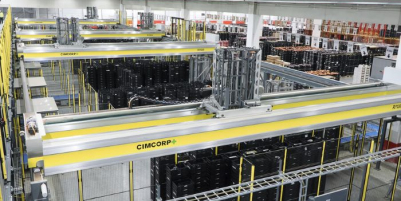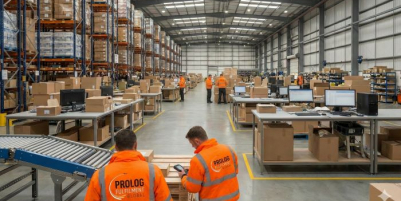-
Nulogy Introduces the Manufacturing Operating System - February 27, 2026
-
Bliss Direct scales to 300 daily orders and saves 25 hours per week with Forterro’s Orderwise ERP - February 25, 2026
-
Wootzwork raises $6.6M to bring predictability to offshore manufacturing - February 25, 2026
-
Rite-Hite unveils new range of hydraulic kits to upgrade and extend dock leveller performance - February 19, 2026
-
REWE and Cimcorp automate fresh supply chain for Berlin supermarkets and stores - February 19, 2026
-
Q1 – A recovery period or time to fix, switch and scale? - February 19, 2026
-
NULOGY’S SHOP FLOOR SOFTWARE TO POWER COMPLETE CO-PACKING’SOPERATIONS - February 13, 2026
-
Why lead generation depends upon good content - February 13, 2026
-
Wallapop and Albatross Sign Strategic Partnership to Bring Real-Time AI Discovery to the Future of Consumer-to-Consumer Commerce - February 12, 2026
-
Thorworld ramp helps Hubergroup to streamline its unloading operation - February 6, 2026
Logistics companies seeking people with the skills required to meet the demands of an increasingly complex and sophisticated world should not overlook the talent that they already have, says Charlie Walker, marketing director of Walker Logistics
While it has been widely reported that the logistics and supply chain industries face a growing shortage of skills and labour, much of the focus has been on the lack of manual or semi-skilled workers. But it could be argued that the dearth of young people with high-level technical skills entering the sector presents a far more serious challenge.
Driven by the demands of modern consumers who expect goods to be on the shelves of bricks and mortar stores and insist on their online orders being delivered to their front door within ever shortening time frames, supply chain management continues its transformation into something of a science. As a result, logistics professionals must now be comfortable dealing with robots and other forms of automated handling technology, analysing endless data streams and engaging with increasingly sophisticated forms of AI.
And, of course, from time to time they have to contend with ‘black swan’ events that shift the landscape in ways that no one can possibly have foreseen – such as Covid and the impact it had on online retailing.
It is comforting for employers to know that having grown up in the digital world, today’s young people are relaxed around technology and excited about using it. Yet bringing together tech-savvy graduates or bright school leavers looking for a rewarding career and logistics companies seeking talented individuals capable of moving their business forward, remains challenging.
The reasons are varied and complex but most surveys continue to highlight the fact that graduates perceive the logistics industry as being poorly paid, unsafe, with a lack of gender diversity (it’s a ‘boy’s club’ they say) and offering little opportunity for professional development.
Unfortunately, the problem is exacerbated by the fact that graduates (as well as switched-on school leavers) are rarely encouraged to choose logistics as a career path after completing their studies. This is, in part, a consequence of the supply chain industry’s relationship with the nation’s Universities and other educational establishments which has not been as good as it might or, indeed, should be for many years.
The way that logistics companies interact with the education system must improve if we are to recruit the caliber of future employees the industry needs.
In the meantime, many logistics companies have realised that to future-proof their organization greater investment in improving the caliber of their existing people is essential.
At Walker Logistics, staff development and progression has always been a priority. We believe that by encouraging a culture of continuous learning we can instill a ‘growth mindset’ within our people at all levels of the business. When employees have the chance to grow and develop within a company, it not only boosts their own careers but also creates a positive and motivated culture across the business that, in turn, helps to attract and retain the best talent.
I am delighted to be able to say that two young people that joined us some time ago in junior roles are the latest members of our workforce to benefit from this approach. The pair have just been promoted to operations manager positions at our multi-user storage hub near Reading.
Having worked on the shopfloor their promotions provide a clear demonstration for other employees that through hard work, it is possible to have a very worthwhile career with Walker Logistics. Because our colleagues know that the company is prepared to invest in their professional development their dedication grows, which – in turn – means our staff turnover drops as do the costs incurred by recruiting and ‘bedding in’ new people.
It is the responsibility of everyone in the industry to ensure that the supply chain sector has the skills required to meet the demands of an increasingly complex and sophisticated world. But until such time as intelligent young people are consciously choosing to embark upon a career in logistics above say media, accountancy or engineering, it will be necessary for logistics operators to sell the idea of logistics as more than a steppingstone on the pathway to something ‘better’ to the smartest members of their existing team.

































